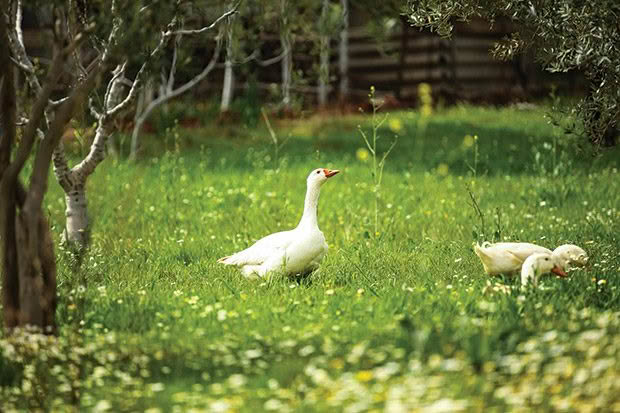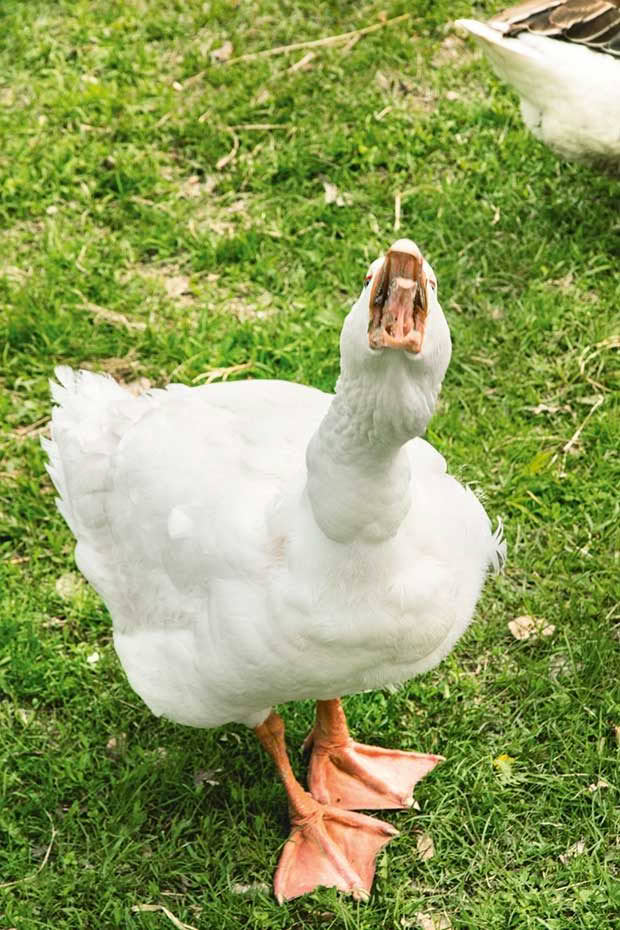Nadene Hall discovers peace was never an option with her geese

Geese are my favourite birds, and I don’t know why.
Words: Nadene Hall
The noise is loud and pre-dawn. It sounds like bird murder by marauding warriors.
But it’s just the song of late winter, and it’s just my four Pilgrim geese, at 4am.
The other animals on my block celebrate the warming temperatures and floods of happy hormones with skipping, jumping, a little head butting. The odd, inappropriate overture to a sibling.
But geese are very loud. Very soprano-being-hit-on-the-foot-with-a-hammer. Spring also signals the start of the annual goose marathon. They normally stay in one paddock, close to their beloved paddling pools.
But in spring, they often wander as far as their short legs will take them. It’s surprising how far and fast stumpy, flat-footed birds can move. One day, I calculated they walked over a kilometre.
Unfortunately, on one of these circuits, one of our two females didn’t come back. I found her lying dead beside the neighbour’s driveway, hit by a car. It was sad for me. Her family kept on waddling.
Her daughter laid 10 eggs in the next 10 days, choosing the most rat-infested, remote spot. She wasn’t happy to see me on my daily visits.

Geese communications are intimidating. They hiss like snakes. If they’re not hissing, they’re honking and shrieking at high volume. They go from elegant to ugly in an instant.
I was in for a lot of ugly. Ten extra geese would be too many, so Operation Steal Five Eggs Without Serious Injury was hatched. We took an umbrella and a bucket. I would grab eggs while a friend fended Goose off with the umbrella.
Goose was outraged. She screamed, alerting our two ganders who came over at top waddle. To her disgust, they stopped at the fence.
It was the umbrella’s last day. She grabbed it, wrenched it, snapped it.
I managed to grab five eggs. But you know you’ve come close to danger when you’re wiping goose spit out of your hair.
It was also upsetting. Goose cried and cried as we walked away. Feeling those warm eggs and knowing I was condemning the fertile ones was sad.
The next day, as I leaned over – at the very edge of my reach – to tip her food out, Goose grabbed the plastic ice cream container and ripped the side out of it. Try doing that with your far more dextrous hands and you’ll understand the power of a pissy, hissy, grieving goose.
About 28 days later, I spotted a hole in an egg. The next morning, there was a fluffy, peeping gosling.
I could definitely hear more than one gosling though. Like most poultry, about-to-hatch goslings ‘talk’ to their mother through the shell (and she talks back).
I read the blog of an experienced goose farmer who wrote a clutch of eggs will often hatch over 2-3 days. But sadly for Goose, there were no more goslings. On the fifth day, she left the nest.
Since then, I’ve read about the terrible fertility rate of Pilgrim geese. How smaller eggs are less likely to be fertile, or don’t hatch if they are. Next time I will risk more of my life and limbs to take the small ones.
The goose farmer-blogger also wrote that in the last few days before hatching, particularly studious geese don’t get off the nest. Normally, they leave it each day for a short time to eat, drink and bathe. The water that remains on their feathers plays an important role in wetting the eggs, which helps to maintain humidity. No water, wrong humidity, and the goslings can be ready to hatch, but unable to get out through the thick shell.
The farmer uses a squirt bottle to dampen the eggs and feathers of her geese on those critical days. Next time, I will be armed and ready.
Love this story? Subscribe now!
 This article first appeared in NZ Lifestyle Block Magazine.
This article first appeared in NZ Lifestyle Block Magazine.
